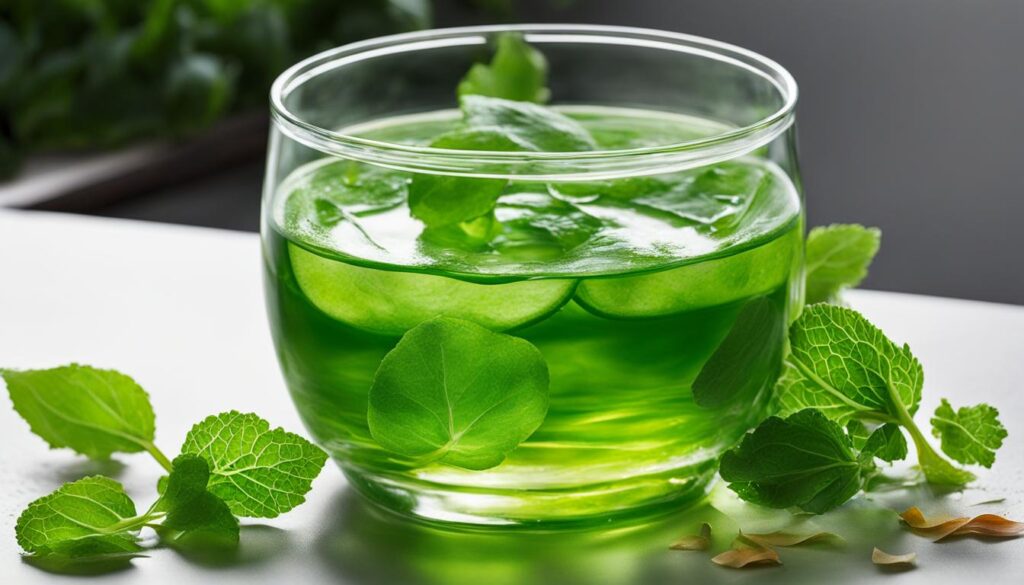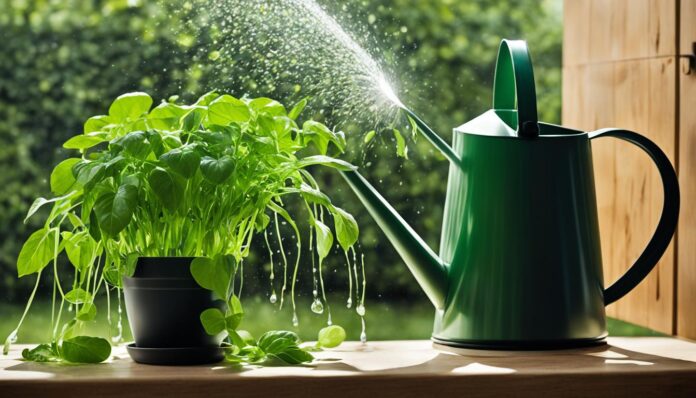Are you looking for an eco-friendly gardening practice that promotes plant nutrition and water recycling? Look no further than green watering! This innovative technique involves using vegetable cooking water as a homemade fertilizer for your plants. Not only does it save you money on store-bought fertilizers, but it also contributes to sustainable gardening practices.
When you boil vegetables, pasta, or eggs, the cooking water becomes infused with essential micronutrients like phosphorus, nitrogen, and calcium. These micronutrients act as fertilizers for your plants, providing them with the nourishment they need to thrive. By utilizing vegetable cooking water, you not only enhance plant growth but also reduce water wastage and promote a greener environment.
Key Takeaways:
- Green watering is an eco-friendly gardening practice that utilizes vegetable cooking water as a homemade fertilizer.
- Vegetable cooking water contains essential micronutrients that promote plant nutrition and growth.
- Using vegetable cooking water helps save money on store-bought fertilizers and reduces water wastage.
- This sustainable gardening practice aligns with eco-friendly lifestyles and promotes a greener environment.
- Start slowly and gradually incorporate vegetable cooking water to prevent over-fertilizing your plants.
The Benefits of Using Vegetable Cooking Water
Using vegetable cooking water as plant fertilizer offers numerous benefits that promote sustainable practices, kitchen waste reduction, water conservation, and organic gardening.
1. Sustainable practices and kitchen waste reduction
One of the primary advantages of using vegetable cooking water is its contribution to sustainable practices. By utilizing this water, you can repurpose kitchen waste that would otherwise be thrown away. This reduces food waste and supports a more eco-friendly lifestyle.
2. Water conservation
Reusing vegetable cooking water helps conserve water resources. Instead of pouring it down the drain, this practice allows you to repurpose water that has already been used for cooking. This is especially beneficial in areas facing water scarcity, where every drop counts.
3. Organic gardening
Using vegetable cooking water aligns with the principles of organic gardening. It provides plants with natural and organic nutrients, promoting their overall health and growth. Organic gardening practices prioritize the use of natural materials and emphasize environmental sustainability.
Overall, incorporating vegetable cooking water as plant fertilizer not only reduces kitchen waste and promotes sustainable practices, but also conserves water and supports organic gardening principles. It’s a simple yet effective way to nourish your plants while minimizing environmental impact.
How Vegetable Cooking Water Works and How to Use It
Vegetable cooking water is a valuable resource for plant growth and can be utilized as a nutrient-rich homemade fertilizer. When vegetables, pasta, or eggs are boiled, micronutrients such as nitrogen, phosphorus, and calcium leach into the water. These micronutrients act as natural fertilizers that promote plant growth and overall health.
To harness the benefits of vegetable cooking water, it’s essential to know how to properly use it. Here are the steps to incorporate this nutrient recycling practice into your gardening routine:
- Cool the vegetable cooking water: After boiling your food, allow the water to cool down completely. This ensures that the temperature is suitable for watering your plants without causing any damage.
- Water your plants: Once the cooking water has cooled, use it to water your plants. Pour it directly at the base of the plants, avoiding the leaves to minimize the risk of disease.
- Start slow: It’s important to start with small amounts of vegetable cooking water and gradually increase the quantity. Over-fertilizing can lead to nutrient imbalances and harm your plants.
- Consider using egg cooking water: The water used to boil eggs also contains calcium, which is vital for plant growth. Incorporating egg cooking water alongside vegetable cooking water can provide additional nutrients to support healthy plant development.
By following these simple steps, you can effectively use vegetable cooking water to nourish your plants and enhance their overall growth and vitality.
Remember to assess the specific needs of your plants and adjust the frequency and amount of watering accordingly. Observing your plants’ response to the homemade fertilizer will help you determine the ideal application rate. Nutrient recycling through vegetable cooking water not only reduces waste but also promotes a sustainable approach to gardening.
| Advantages of Using Vegetable Cooking Water as Fertilizer |
|---|
| 1. Nutrient Recycling |
| 2. Cost-Effective Homemade Fertilizer |
| 3. Promotes Plant Growth |
| 4. Eco-Friendly Watering Solution |
Other Uses for Vegetable Peel Water

In addition to using vegetable cooking water, you can also make use of vegetable peel water as a natural fertilizer. Vegetable peel water is obtained by boiling or soaking vegetable peels in water to extract the nutrients. This nutrient-rich water contains minerals like potassium, calcium, and iron that are beneficial for plant health. Vegetable peel water can be used to promote soil bacterial growth, deter pests, and provide essential nutrients to plants. It can be applied through top watering, bottom watering, or misting, depending on the specific needs of your plants.
Benefits
- Promotes soil bacterial growth: The nutrient-rich water from vegetable peels contains organic compounds that stimulate the growth of beneficial soil bacteria. These bacteria improve soil structure, nutrient availability, and overall plant health.
- Deters pests: Certain compounds found in vegetable peel water, such as polyphenols, can act as natural pest deterrents. Spraying vegetable peel water on plants can help repel pests and reduce the need for chemical pesticides.
- Provides essential nutrients: The minerals present in vegetable peel water, such as potassium, calcium, and iron, are vital for plant growth and development. Applying this water directly to the roots or foliage of plants ensures they receive the necessary nutrients for optimal health.
Using vegetable peel water as a fertilizer is a cost-effective and sustainable way to enhance plant growth and improve the overall health of your garden. By harnessing the nutrients present in vegetable peels, you can reduce waste and create a nutrient-rich solution for your plants.
| Mineral | Benefits |
|---|---|
| Potassium | Aids in water and nutrient uptake, supports cell growth, and enhances plant resilience against environmental stressors. |
| Calcium | Strengthens cell walls, promotes root development, and helps prevent blossom end rot in tomatoes and other plants. |
| Iron | Essential for chlorophyll synthesis, which is crucial for photosynthesis and overall plant vigor. |
Using Egg Water and Potato Water as Plant Fertilizers
Apart from vegetable cooking water, you can also harness the power of other kitchen byproducts to enhance your homemade fertilizers. Two such examples are egg water and potato water, which offer unique benefits for plant health and resilience.
Egg water, obtained by cooling the water used to hard-boil eggs, is a rich source of calcium. Calcium plays a crucial role in supporting cellular structure and facilitating nutrient uptake in plants. By incorporating egg water into your homemade fertilizer routine, you provide your plants with the necessary calcium they need to develop strong and healthy roots, stems, and leaves, resulting in overall plant health and vitality.
On the other hand, potato water, derived from boiling potato peels, contains significant amounts of essential minerals, particularly potassium. Potassium is essential for plants to develop resilience against environmental stressors, such as extreme temperatures, drought, and diseases. By utilizing potato water as a plant fertilizer, you enhance your plants’ ability to withstand challenging conditions, thrive, and maintain optimal growth.
By including egg water and potato water in your repertoire of homemade fertilizers, you can ensure that your plants receive a diverse range of nutrients and support their resilience, nutrient uptake, and overall well-being. Experiment with these natural and cost-effective alternatives to commercial fertilizers and see the positive impact they have on your plant’s health and productivity.
FAQ
How does using vegetable cooking water benefit plants?
Vegetable cooking water contains micronutrients like phosphorus, nitrogen, and calcium that act as natural fertilizers for plants, providing essential nutrients for growth.
Why is using vegetable cooking water considered eco-friendly gardening?
Using vegetable cooking water allows for the recycling of water and the utilization of kitchen waste, promoting sustainable practices and reducing food waste.
How does using vegetable cooking water help with water conservation?
By reusing vegetable cooking water, you can reduce the amount of water needed for your plants, contributing to water conservation efforts, especially in regions with water scarcity.
How does vegetable cooking water work as a plant fertilizer?
When food is boiled, micronutrients leach into the water. These micronutrients, such as nitrogen, phosphorus, and calcium, act as natural fertilizers and promote plant growth when watered with the cooking water.
How should I use vegetable cooking water as a plant fertilizer?
After boiling your food, let the cooking water cool down and use it to water your plants. It’s important to start with small amounts and gradually incorporate vegetable cooking water to prevent over-fertilizing your plants.
Can I use vegetable peel water as a natural fertilizer?
Yes, vegetable peel water is nutrient-rich and contains minerals like potassium, calcium, and iron that are beneficial for plant health. It can be used to promote soil bacterial growth, deter pests, and provide essential nutrients to plants.
How do I make vegetable peel water?
To make vegetable peel water, you can boil or soak vegetable peels in water. The nutrients will extract into the water during this process, creating a nutrient-rich solution that can be used as a natural fertilizer.
What are the benefits of using egg water and potato water as plant fertilizers?
Egg water, obtained from cooling the water used to hard-boil eggs, is rich in calcium, which supports cellular structure and aids in nutrient uptake. Potato water, derived from boiling potato peels, is packed with essential minerals, especially potassium, that help plants develop resilience against stressors and diseases.
How can I use egg water and potato water as plant fertilizers?
After cooking eggs, let the water cool and use it to water your plants. For potato water, allow the water used to boil potato peels to cool down before using it as a fertilizer. Both egg water and potato water provide valuable nutrients for optimal plant growth and health.

